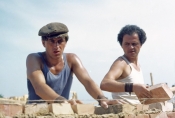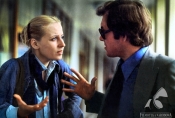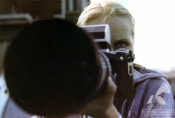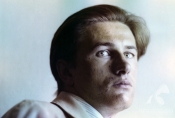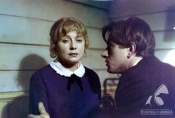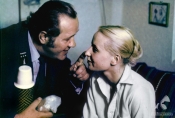MAN OF MARBLE [1976]
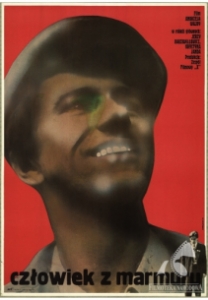
year:
- 1976
release date:
- 25 II 1977
runtime:
- 153 min
directed by:
- Andrzej Wajda
written by:
- Aleksander Ścibor-Rylski
director of photography:
- Edward Kłosiński
cast:
- Jerzy Radziwiłowicz [Mateusz Birkut, Maciek Tomczyk (Birkut's son)], Krystyna Janda [Agnieszka], Tadeusz Łomnicki [Jerzy Burski], Jacek Łomnicki [Jerzy Burski in the 1950s], Michał Tarkowski [Wincenty Witek], Piotr Cieślak [Michalak], Wiesław Wójcik [camrade Jodła], Krystyna Zachwatowicz [Hanka Tomczyk], Magda Teresa Wójcik [a screenplay writer], Bogusław Sobczuk [a TV journalist], Leonard Zajączkowski [Leonard Zajączkowski ]
edited by:
- Halina Prugar
music by:
- Andrzej Korzyński
production design:
- Allan Starski
produced by:
- Zespół Filmowy „X”
executive producer:
- Barbara Pec-Ślesicka
awards:
-
- Polish Feature Film Festival Gdańsk 1977: Journalist Award
- Cannes Film Festival (France) 1978: FIPRESCI Award
- IFF Brussels ( Belgium) 1979: Crystal Star for Jerzy Radziwiłowicz
- IFF Belgrade (Yugoslavia ) 1979: award for best performance for Jerzy Radziwiłowicz
- IFF Cartagena (Spain ) 1980: Special Jury Award
About the film
The film is a synthesis of the recent history of post-war Poland. It links two eras: the years of reconstruction during the Stalinist period, and the political reality of the seventies. It shows the tragedy of people who believe in the significance of communist transformation, only for this belief to be destroyed by the system. It mocks the bureaucratic mechanisms of an authoritarian system. It shows how to exercise power over culture and the mass media, and depicts people ready to compromise to save the facade of independence. The film had a limited distribution but nevertheless played an important role in shaping the attitudes of civil society of the 1980s.
Two timelines, connected by the character of an ambitious journalist − Agnieszka. For her diploma film, Agnieszka chooses the life of Mateusz Birkut − an over-achieving worker from the 1950s. After obtaining approval for the film, she begins investigating Birkut. She interviews many people who knew him.
From their accounts, Birkut’s life emerges – he held a record for laying bricks. He traveled throughout Poland, teaching masonry techniques to workers. His moment of glory was interrupted by an accident during one of the demonstrations − someone planted a heated brick causing Birkut his disability. Birkut begins to work as an activist. When his best friend is arrested, he tries to help him, for which he is demoted from his role of work leader, and subsequently arrested by the Security Services. After his release from prison, he tries to get his family back, but to no avail. Agnieszka has trouble finding out what eventually happened to Birkut, as all threads break off in 1957. When Agnieszka’s film is rejected by the editor, she returns to her investigation and manages to find Birkut’s son, who, on informing her of his father's death, refuses to help. Ultimately, however, he agrees to cooperate with Agnieszka.
Waldemar Piątek, Leksykon polskich filmów fabularnych, Warszawa 1996
